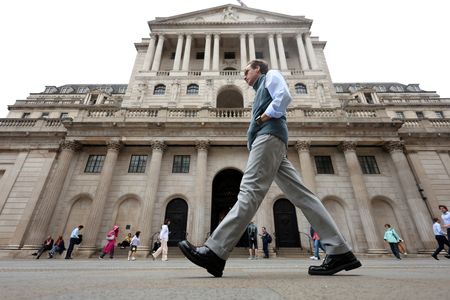By Naomi Rovnick
LONDON (Reuters) -Asset managers whose companies oversee more than $1.5 trillion are urging the Bank of England to scrap bond sales they believe place unnecessary strain on Britain’s government debt, while they also rack up tens of billions of pounds of taxpayer costs.
Reuters spoke to 10 investors who had wanted the central bank to halt the sales before it pledged on September 18 to slow its overall runoff, which includes bonds that mature.
They don’t think the BoE has gone far enough and recommend changing the policy, including a complete halt to sales.
As finance minister Rachel Reeves’ annual budget looms in November, Britain’s long-term borrowing costs are the highest among G7 advanced economies.
Sticky inflation and fiscal worries are depressing the value of bonds, known as gilts, while the BoE is also actively selling its holdings into weak UK debt markets, recording losses.
On Monday, 30-year gilt yields were up around 3.5 basis points (bps) to 5.5% and 10-year yields rose by around the same amount to 4.73% as traders sold the debt.
GILT MARKET INSTABILITY
The Treasury compensates the central bank for bond-market losses. While taxpayers previously benefited from gains on the bonds, the arrangement now costs the government 22 billion pounds ($29.6 billion) annually, research by former BoE economist Carsten Jung shows.
“Many investors including ourselves have been saying to the Bank of England you’re making the problem worse, not better. Stop doing this,” said RBC BlueBay Asset Management fixed income CIO Mark Dowding, who directly oversees assets of about $154 billion. He said he doesn’t own gilts and is betting on the pound weakening against the euro.
Dowding had shared his view with BoE officials before the central bank announced it would reduce the pace of the gilt runoff to 70 billion pounds ($94 billion) from 100 billion pounds annually. He’s still expecting gilt market instability and has since suggested to the UK debt office to stop issuing long-dated bonds to raise funds.
The BoE declined to comment while a Treasury spokesperson declined to comment on whether the government would consider changes to reduce the strain on public finances.
The BoE hoovered up 875 billion pounds worth of government bonds between 2009 and 2021 to support the UK economy and then moved to offload them faster than other major central banks. This so-called quantitative tightening followed years of easing by central banks in the aftermath of the global financial crisis and the pandemic.
‘FISCAL FEEDBACK LOOP’
A 2024 Treasury Committee report called the QT plan a “leap in the dark” with more public money at stake than was ever envisaged. One 40-year gilt issued in 2020 is now trading at 24% of its original issue price, in a sign of the potential losses the BoE faces.
The BoE has said that the net cash flow benefit to taxpayers since 2012 is still 34 billion pounds, funds used for government spending amid pressure to boost growth for increasingly disillusioned voters.
And while losses push up one measure of Britain’s debt, gilt sales improve the current budget deficit measure that Reeves targets. That’s because they reduce bank reserves on the BoE’s balance sheet on which it pays interest.
Data crunched by Columbia Threadneedle’s Christopher Mahon, head of dynamic real return for multi-asset and with a neutral position on gilts, shows the extra debt interest costs from active quantitative tightening were between 1 billion and 3 billion pounds annually.
He will “continue to push the topic” at future meetings with the BoE because the announced reduction is too small to make an impact on wobbly gilt markets, he said.
Central banks moving in lockstep to end quantitative easing since 2021 has lifted debt yields globally but the effect has been amplified in the UK, a 2024 study published by the National Bureau of Economic Research estimated, with the BoE’s active sales raising yields by up to 70 basis points (bps). One basis point is one-hundredth of a percentage point, or 0.01%.
The U.S. Federal Reserve and the European Central Bank have instead allowed debt to roll off their books as bonds mature, with the effect of raising yields by about 20 bps, the NBER paper said.
The BoE said in August that its debt sales added 15 to 25 bps to gilt yields.
For Paul Flood, head of mixed assets at BNY Investments Newton, active UK QT affected UK debt sustainability via a “fiscal feedback loop” of higher public sector costs and higher gilt yields.
“I think it’s madness,” Artemis’ head of fixed income Stephen Snowden said. “Active quantitative tightening should be stopped altogether. It’s ruinous for the taxpayer.”
($1 = 0.7429 pounds)
(Reporting by Naomi Rovnick; additional reporting by David Milliken, Nell Mackenzie and Yoruk Bahceli; Editing by Dhara Ranasinghe, Elisa Martinuzzi and Aurora Ellis)











